The EURoma network held its first management committee of the year 2009 in Budapest, Hungary, on the 7th and 8th of May.
On the 6th and 7th May, participants in the working group on education debated how to fight against the segregation of Roma children in the educational system using the Structural Funds. On its side, the social inclusion working group discussed the administrative capacity for the implementation of Structural Funds projects aimed at the social inclusion of the Roma as well as setting up mechanisms for coordination and follow-up actions aimed at the Roma population supported by Structural Funds.
Working Group on Social Inclusion
On the 6th and 7th of May the second meeting of the Working Group on Social Inclusion took place in Budapest. There were around 20 participants (see list) taking part in debates and discussions. As previously agreed, the two main topics addressed were (see agenda):
- Mechanism for coordination and follow-up actions aimed at the Roma supported by Structural Funds (SF).
- Administrative capacity for the implementation of SF projects aimed at the social inclusion of the Roma.
Coordination and follow-up mechanisms of actions aimed at the Roma population supported by Structural Funds (SF)
Following the welcome and introduction of the main aims of the session, the different members took the floor to provide insights on how the coordinating mechanisms were developed at the level of each Member State (MS) and to identify the main weaknesses and strengths of such existing mechanisms. Despite the expressed differences among each MS, the underlying common goal was the need to improve coordination between those structures in charge of social issues and those in charge of managing SF as a way to achieve a real synergy of actions and policies and consequently, a concrete and substantial impact.
Following a fruitful discussion the WG agreed that having some short description of existing coordinating mechanisms in each MS was convenient and helped to learn better from each other and to compare existing practices.
It was also agreed that the WG should continue to discuss this issue in future meetings and will jointly develop an optimal coordination structure/model whose elements could be a reference for MS.
Administrative capacity for the implementation of Structural Funds projects aimed at the social inclusion of the Roma
On the second day, discussion focused on the question already raised in previous meetings: to what extent those administrations in charge of social inclusion policies and plans have the capacity to implement effective actions for the inclusion of the Roma? An analysis of different MS illustrated the scarce knowledge on Roma needs that many local and regional administrations have and the unfortunate widespread lack of political will from local and regional administrations to tackle Roma inclusion. In a number of countries this situation may be exacerbated by the fact that the Roma are not recognised as a specific group but are rather included in the categories ‘vulnerable’ or ‘excluded’ groups.
After a round of interventions it was generally agreed that the main obstacles to local and regional action were related to the lack of political will and to the pervasive inexistence of a wider national plan including the obligation by localities to develop actions for the Roma, as the most socially excluded group. The constraints encountered in some cases by local authorities when accessing Structural Funds were also underlined.
Proposals for actions included the organisation of a transnational seminar aimed at sensitising and informing localities and regional authorities from different MS on the needs, strategies and means required to advance the social inclusion of the Roma. Bringing together administrations from different MS, in some cases to present positive experiences and in others, to facilitate learning good practices from others, is expected to have a positive impact on the promotion of more and better interventions for the Roma at the local level. The pending issue is the financing of such an event and the place where it will take place (Italy is one of the proposed options, still to be confirmed). Dates are still unconfirmed but the event is likely to take place during the last quarter of the year 2009.
It was also decided that an engagement in further discussions on the issue of administrative capacity in future meetings of the WG was required. In concrete terms, there was agreement on the need for further analysis of the potential improvements that Administrative Units of ESF could envisage and promote for their own functioning, as a way to increase and improve the implementation of interventions directed at the Roma.
Education Working Group meeting
Under the coordination of the host country Hungary, members of the EURoma Education Working Group (see participants list) debated the issue of segregated education for Roma children, as well as the policies implemented in participating countries to overcome discriminatory practices in the field of education (see agenda). Special attention was given to initiatives funded by Structural Funds that mainly complement national/regional or local programmes.
After welcoming words from Mr. Tamás Jankó from the Hungarian National Development Agency, the meeting began with presentations by the Roma Education Fund (REF), the Hungarian Ministry of Education and Culture and the Autonomia Foundation:
Mr. Tobias Linden and the REF team offered an overview of this Foundation and the main initiatives that it has carried out in the field of education. Participants had the opportunity to exchange ideas on how to design and implement projects using Structural Funds, as well as the support that this institution provides in the Roma Decade countries.
Mrs. Szilvia Pallaghy Hegyi, representing the Ministry of Education and Culture then offered an in-depth analysis of the Hungarian educational system and how Structural Funds are assisting in the inclusion of children from underprivileged backgrounds in the Hungarian public system.
Afterwards, Ms. Anna Csongor from the Autonomia Foundation presented the “Bridge” development partnership, funded by the Equal Community Initiative, which allowed other participants to see how to mainstream local plans into national policies, its difficulties and benefits, as well as the importance of political will, coordination and coherence of initiatives.
The following day opening presentations were delivered by Ms. Savelina Roussinova from the Open Society Institute, Ms. Orsolya Szendrey from the REF and Ilona Negro from the ESF-Coordination Unit, DG EMPL. – European Commission. This session offered participants the opportunity to debate different implementation experiences, mainly at two levels: on one side nation-wide anti-segregation policies, which mean structural changes in public educational system and how some countries have addressed this issue; and on the other side, small-scale initiatives and projects being developed by public or private bodies (pilot projects, local initiatives, etc).
Later on Mr. Gábor Kézdi from the Central European University offered a presentation on research focused on integration efforts: “The Impact of the OOIH School Integration Program in Hungary on Classroom Work, Skills and Inter-Ethnic Attitudes”. The outcomes and data obtained in the aforementioned research were very much appreciated by country representatives.
Finally, Hungarian representatives Mr. Andor Ürmos from the Ministry of Labour and Social Affairs and Mr. Tamás Jankó from the National Development Agency put forward two recommendations on: the equal opportunity based development policy and pre-schooling that were debated later on in the Management Committee Meeting.
Management Committee Meeting
More than 40 people (see list of participants) attended the Management Committee meeting representing Network partners from 11 EU Member States, the Technical Secretariat and a large delegation from the European Commission (DG EMPL and DG REGIO).
Hungarian partners, represented by Tamás Jankó (National Development Agency) and Andor Ürmos (DG Roma Integration), together with Carlos Tortuero (Director of the Spanish ESF Unit) welcomed the participants and wished them a fruitful meeting.
The Technical Secretariat (TS) presented the programme of the meeting and provided the framework within which the different topics would be dealt with. TS made a review of the short- and medium-term commitments and pending tasks for partners in order to achieve the Network’s objectives.
Representatives from the EC informed Network partners about recent developments such as the launching of the EU Roma Platform, the High Level Meetings, which will be initiated by Hungary before the end of 2009, and updated details on the DG REGIO Pilot Project to be launched soon.
Representatives from the 3 Working Groups (Employment, Social Inclusion and Education) presented the conclusions of their respective working sessions and the next steps to be taken within each WG.
Given the necessary link between the Structural Funds and the Social Inclusion Policy when referring to the Roma population, Ms Katarina Lindhal, Deputy Head of Social Inclusion Unit, presented the EC Joint Reporton Social Inclusion and Social Protection, adopted by EPSCO Council and Commission on March 9th.
Network partners had the opportunity to undertake a field visit in order to obtain more detailed and direct information on an ESF education project being implemented in Pesterzsébet, a district municipality of Budapest.
The Thematic Conference focused on a very relevant and sensitive topic: the collection and management of ethnic data and its use for projects follow-up and monitoring. Representatives of the EU Agency for Fundamental Rights (Ioannis Dimitrakopoulos, Head of Department for Equality and Citizens Rights), Hungarian Central Statistical Office (Virag Erdei), and Hungarian National Development Agency (Tamás Jankó) offered their different points of view on the issue and opened the debate among partners.
RELATED DOCUMENTS
Management Committee:
- Agenda
- Joint Report on Social Protection and Social Inclusion 2009
- Joint Report Working Questionnaire
- EC information update: Roma policies and Roma platform
- Study Visit
- Thematic Conference: Data Collection
- Data Collection presentation
- Data Collection Hungarian Central Statistical Office
- Data Collection FRA
- Press Release
Education Working Group:
- Agenda
- List of participants
- REF presentation
- Hungarian Ministry of Education
- Bridge Equal Project
- Integration Education Program doc
- Integration Education Program presentation
- Country Presentation
- Questionnaire for the discussion
Social Inclusion Working Group:
PHOTO GALLERYS
-
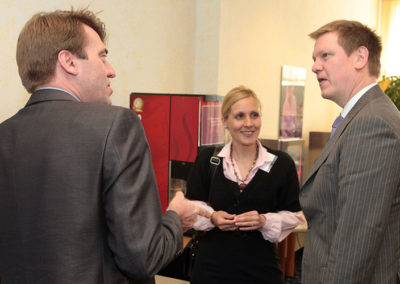
-
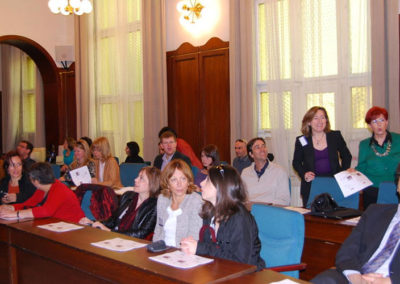
MCM Study Visit Pesterzsébet Municipality
-
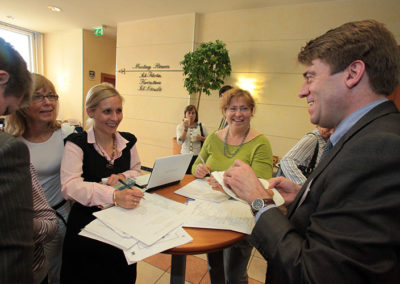
-
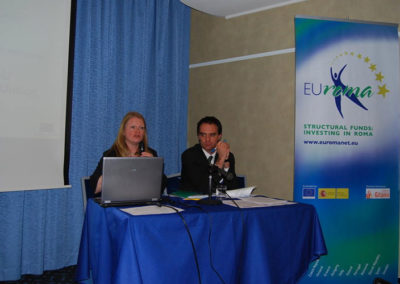
MCM Joint Report presentation Katarina Lindahl - European Commission
-
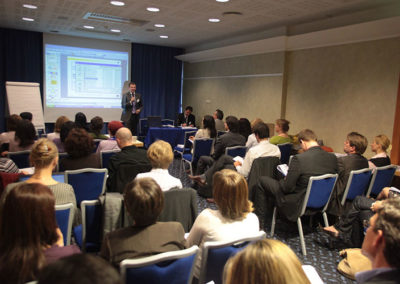
-
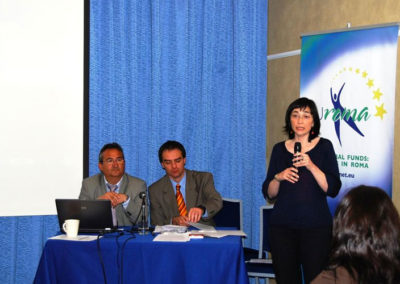
MCM closing of the Meeting Carlos Tortuero and Jankó Tamás
-
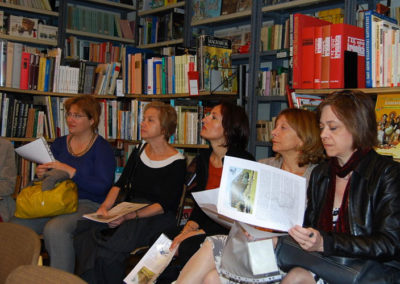
MCM Study Visit Hajós Alfréd Elementary School
-
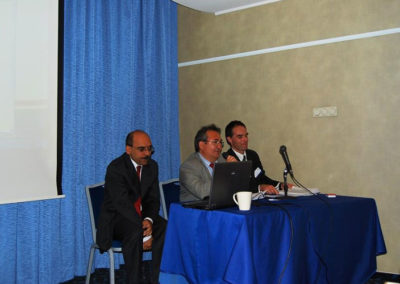
Inauguration MCM EURoma: Andor Urmos, Carlos Tortuero and Jankó Tamás
-
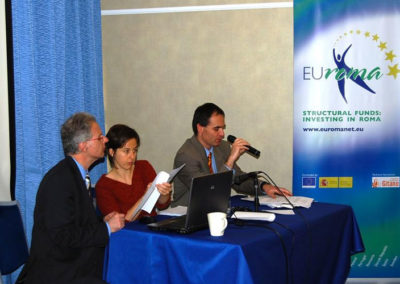
MCM Data Collection Thematic Conference - Ioannis Dimitrakopoulos FRA
-
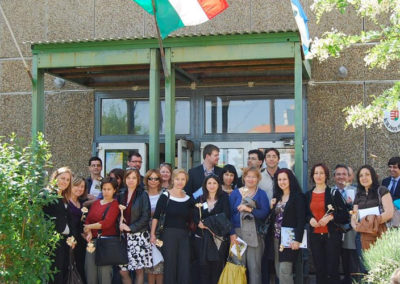
MCM Study Visit Hajós Alfréd Elementary School
-
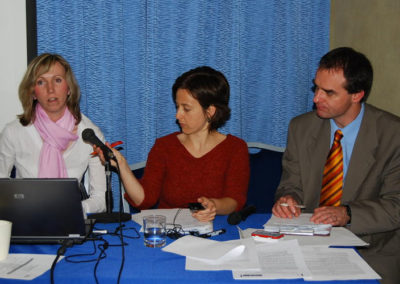
MCM Data Collection Conference Virag Erdei Hungarian Central Statistical Office and Tamás Jankó Hungarian National Development Agency

